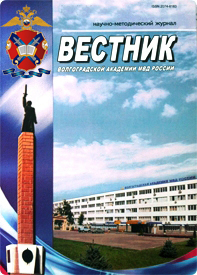In recent years, state and non-state structures are paying increasing attention to issues related to the prevention of the commission of new willful crimes by persons who have already served a sentence in a correctional institution. This is not accidental, because, according to official statistics, in 2016 more than 56% of the crimes investigated were committed by previously convicted persons. Such a negative trend requires the state to respond appropriately, aimed at maximum correction of convicts who were previously brought to criminal responsibility, as well as strengthening the post-penitentiary influence on persons released from correctional facilities during a certain period of their freedom. Taking into account the existing social and economic situation in the country and the current structure and dynamics of the appointment of sentences in the form of deprivation of liberty with serving in correctional facilities, the article justifies the advisability of making changes in the Russian Federation's criminal executive legislation in the form of an additional norm providing for mandatory post-penitentiary influence on convicts, released from correctional facilities. This will have a positive effect on the resocialization of former convicts, as well as on the prevention of the recurrence of crimes. The authors come to the conclusion that the proposed change in the legislation will allow state bodies, public organizations and civil society institutions to provide targeted assistance to convicts released from correctional institutions in solving social, domestic and moral and psychological problems that they face when they are released from their places deprivation of liberty. In addition, this will facilitate the refusal of previously convicted persons from committing new intentional crimes after their release from places of deprivation of liberty.
persons who have served their sentences in a correctional institution, prevention of recidivism of crimes, post-penitentiary influence
1. Zablockaya A. G., Alekseeva A. P., Kolbasina E. E. Latentnaya prestupnost': ponyatie, prichiny, sposoby izmereniya i protivodeystviya: ucheb. posobie. Volgograd: VA MVD Rossii, 2008. 88 s.
2. Alekseeva A. P. Perspektivy dal'neyshego reformirovaniya rossiyskih organov vnutrennih del i povyshenie kachestva raboty po bor'be s prestupnost'yu // Kriminologicheskiy zhurnal Baykal'skogo gosudarstvennogo universiteta ekonomiki i prava. 2014. № 1. S. 77-83.
3. Sencov A. S., Volkolupova V. A. Obschie voprosy individualizacii ugolovnoy otvetstvennosti na sovremennom etape // Teoriya i praktika obschestvennogo razvitiya. 2013. № 11.
4. Oficial'nyy sayt MVD Rossii. URL: https://mvd.ru (data obrascheniya: 18.06.2017).
5. Alekseeva A. P. Dorozhnaya karta dal'neyshego reformirovaniya organov vnutrennih del Rossiyskoy Federacii (dostupnost' pravoohranitel'noy pomoschi): problemy i perspektivy realizacii // Nauchnyy vestnik Omskoy akademii MVD Rossii. 2013. № 3 (50). S. 7-11.
6. Strilec O. V., Kanubrikov V. A. K voprosu o sisteme principov ugolovnogo prava // Yurist'-Pravoved'. 2012. № 5 (54). C. 14-18.
7. Sencov A. S., Volkolupova V. A. Social'no-politicheskoe soderzhanie ugolovnoy otvetstvennosti // Yuridicheskaya nauka i praktika. Al'manah nauchnyh trudov Samarskogo yuridicheskogo instituta FSIN Rossii. 2014.









